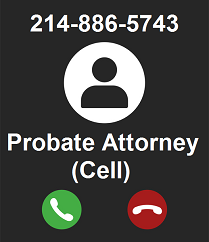Probate: 469.708.6050
Wills & Guardianship: 214.227.6400
13355 Noel Rd., Ste. 1100
Dallas, Texas 75240
Can convicted felons serve as executors?
Section 304.003 of the Texas Estates Code provides as follows:
Section 304.003. Persons Disqualified to Serve as Executor or Administrator.
A person is not qualified to serve as an executor or administrator if the person is:
(1) incapacitated;
(2) a felon convicted under the laws of the United States or of any state of the United States unless, in accordance with law, the person has been pardoned or has had the person's civil rights restored;
(3) a nonresident of this state who:
(A) is a natural person or corporation; and
(B) has not:
(i) appointed a resident agent to accept service of process in all actions or proceedings with respect to the estate; or
(ii) had that appointment filed with the court;
(4) a corporation not authorized to act as a fiduciary in this state; or
(5) a person whom the court finds unsuitable.
I was convicted of a felony but I finished my sentence. Can I serve as executor? The answer depends on if you were pardoned or had your civil rights restored.
Pardon. A pardon is a term for forgiving for a particular crime without actually clearing a felony record. Felons who have a criminal conviction for which they believe the sentence was too harsh or not deserved given the circumstances can apply for a pardon. In Texas, the Governor has the power to pardon via a recommendation from the Texas Board of Pardons and Paroles. You would probably know if you received a pardon.
Restoration of Civil Rights. A person placed on “deferred adjudication community supervision” under article 42A.101, Code of Criminal Procedure, who subsequently receives a discharge and dismissal under section 5(c), article 42.12 (discharge after completion of community supervision), is no longer subject to most collateral consequences, including firearms disabilities. See Tex. Code Crim. Proc. art. 42A.111(c) (“a dismissal and discharge under this article may not be considered a conviction for the purposes of disqualifications or disabilities imposed by law for conviction of an offense,” but it may be taken into account in a subsequent prosecution, and for certain licensing purposes).
You should contact the attorney that handled your criminal defense to determine whether your civil rights, including the right to serve as executor, were restored.
So what do I do if I am named as executor but I am disqualified from serving under Section 304.003? Typically the court will appoint an alternate executor named in the Will. If there is not one named, or the alternates are unwilling to serve, the devisees named in the Will can agree to appoint a third person to serve as Administrator. Finally, in some instances, the appointment of an executor is not required. The Will can be admitted to probate as a muniment of title only. See https://duranfirm.com/probate_with_a_will.php













